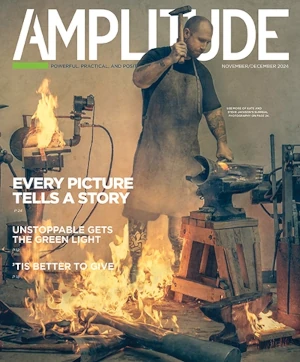
Photo by Cornelia Peterson
About a decade ago, Randy Layman was in the grip of a textbook midlife crisis. He had a young family and a thriving career in the restaurant business. But he was also working too hard, drinking too much, and casting about for a purpose.
“I needed a reset,” says Layman. “I needed to explore what I might be capable of doing with my life.”
He found the answer, quite unexpectedly, after losing his left leg below the knee in a 2022 motorcycle accident. That event, combined with some changes Layman had already embraced, pointed him toward a new, more fulfilling life path as a certified psychedelic guide specializing in amputee clients.
“There’s a lot of need and opportunity for people to experience real healing,” says the 43-year-old Layman, who calls his new venture Magic Lamp Guiding. “Not just going through recovery in the hospital or working with physical therapists or psychotherapists, but spiritual healing. Psychedelic medicines showed me another way to understand myself and shine light into some dark, shadowy areas. I want to create a safe way for amputees to experience the same type of healing that I have. Because I know how powerful it is.”
Layman’s evolution began in the mid-2010s, when he got sober, took up meditation, and began a practice of daily journaling. After reading Michael Pollan’s best-selling How to Change Your Mind, he added traditional plant-based medicines such as psilocybin and ayahuasca to the mix.
“These medicines allow people to deal with feelings in a way that our society just isn’t set up to address,” Layman says. “They showed me there are other ways to pursue life, other ways to understand yourself. I had many breakthroughs of self-discovery.”
Just as he was beginning to feel whole and healthy again, Layman got hit by a drunk driver while riding his motorcycle in downtown Denver. The impact crushed his left foot.
“The irony was not lost on me,” Layman observes. “For pretty much my entire 30s, I abused alcohol. I never got a DUI, but I got behind the wheel when I shouldn’t have multiple times. I had to wonder, What was my role in [causing the accident]? How much of it was this karmic wheel teaching me a lesson?”
The incident kicked Layman’s quest to redefine himself into overdrive. All of a sudden, he had to acknowledge vulnerability and accept help. “I had this new body,” he continues. “How do I get comfortable with it? How do I remove the fear and the anxiety about the future? Are women going to find me attractive? Am I going to find myself attractive? What am I going to tell my kids? How am I going to be a father?”
About six weeks after his amputation, after he’d weaned himself off the painkillers, Layman planned a psilocybin session to settle back into his body, reintegrate it with mind and soul, address his doubts about living with limb loss, and dispel the sense that he’d somehow brought the accident on himself. “I had a very special, spiritual experience,” he says. “Everything started to connect. After that, I started dreaming about being an amputee”—a healthy sign of peaceful acceptance.
While all this was unfolding, Layman had to confront a parallel health crisis. As doctors were examining him after his motorcycle accident, they discovered a lump on his thyroid. “I was walking around with thyroid cancer and I had no idea,” he says. “If not for the accident, I wouldn’t have known and wouldn’t have had the cancer removed as soon as I did. So it left me in this space where I thought the universe must be trying to push me. I didn’t die from the accident; I dodged the cancer bullet; so what am I gonna do with the rest of my time? How can I be of service to the world?”
Layman quickly settled on the idea of guiding other amputees toward the holistic healing that he’d experienced personally. He was inspired, in part, by the encouragement he received from other amputees during his recovery. “As soon as you make yourself available to the community, the community’s available to you,” he says. Layman began taking courses at the Center for Medicinal Mindfulness, a 12-year-old institute that helped pioneer legal, clinically based professional training in psychedelic plant therapy. After completing the year-long program this spring, Layman launched Magic Lamp Guiding and began accepting clients.
“I truly see my amputation now as a blessing in disguise,” he says. “This is how I want to be of service.” Layman is due to launch his website any day at themagiclamp.org. The site should be live by the end of this week.
More Amplitude articles about clinical uses of psychedelic medicine for amputees
Limb Loss, Psychedelics, Healing, and Ceremony
Amputee Health and the New Science of Psychedelic Drugs




